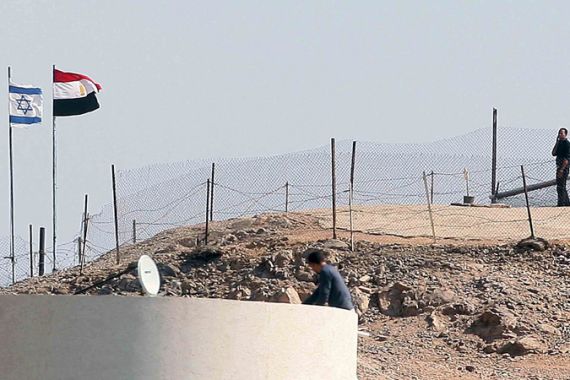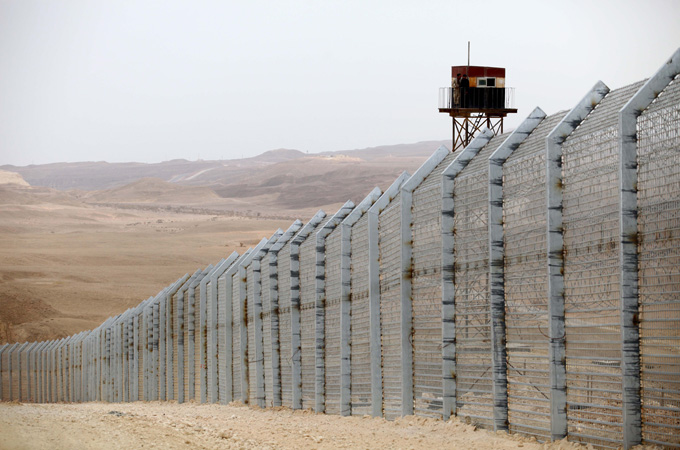Egypt’s Brotherhood warns US over aid cut-off
Muslim Brotherhood says it may review its 1979 peace deal with Israel if US cuts aid to Egypt over recent NGO dispute.

 |
| The 1979 peace deal is the first one which was made between an Arab state and Israel [EPA] |
The Muslim Brotherhood has warned that Egypt may review its 1979 peace deal with Israel if the United States cuts aid to the country, a move that could undermine a cornerstone of Washington’s Middle East policy.
Washington has said the aid is at risk due to an Egyptian probe into civil society groups that has resulted in charges
against at least 43 activists, including 19 Americans who have been banned from leaving the country.
Egypt has been one of the world’s largest recipients of US aid since it signed the peace treaty with Israel, and the Muslim Brotherhood, which does not yet hold the reins of power, said any decision to cut that aid because of the investigation would raise serious questions.
“We [Egypt] are a party [to the treaty] and we will be harmed so it is our right to review the matter,” Essam el-Erian, a senior Brotherhood leader, told Reuters.
“The aid was one of the commitments of the parties that signed the peace agreement. So, if there is a breach from one side it gives the right of review to the parties,” added Erian, the deputy leader of the organization’s Freedom and Justice Party (FJP), the biggest group in the newly elected parliament.
Increased pressure
His remarks are likely to increase pressure on all sides to resolve one of the worst crises in US-Egyptian ties since the treaty was signed.
In similar comments, FJP leader Mohamed Mursi said in a statement that US talk of halting the aid was “misplaced”, adding that the peace agreement “could stumble”.
He said: “We want the march of peace to continue in a way that serves the interest of the Egyptian people.”
The 1979 treaty made Egypt the first Arab state to forge peace with Israel and underpinned Washington’s relationship with Cairo during Hosni Mubarak’s 30-year rule, during which the Brotherhood was officially banned.
The Sinai peninsula, captured by Israel in the 1967 Middle East war, was handed back to Egypt under the agreement, and diplomatic relations between Israel and Egypt were established.
The Muslim Brotherhood has emerged as the single biggest political force in Egypt since Mubarak was ousted a year ago, winning more than 43 per cent of the seats in recent parliamentary elections.
But, for now, Egypt is ruled by a council of military generals to whom Mubarak handed power on February 11, 2011. They are due to make way at the end of June for an elected civilian president, a post the Brotherhood has said it will not contest.
The military council has repeatedly pledged to honour Egypt’s international obligations, including the peace deal with
Israel, a position the Brotherhood has shared until now.
The group has become increasingly outspoken on foreign policy since its parliamentary success, directing harsh criticism at Syrian President Bashar al-Assad’s government over its efforts to crush a revolt against his rule.
NGO issue
In his annual budget message to the US Congress this week, President Barack Obama asked for military aid to Egypt to be kept at $1.3bn and sought $250m in economic aid.
But General Martin Dempsey, the chairman of the Joint Chiefs of Staff, said on Tuesday he had told Egypt’s ruling generals that the NGO issue must be resolved satisfactorily to allow military cooperation with Cairo to continue.
A State Department spokeswoman also said that failure to resolve the impasse could endanger the funds.
Charges filed against those accused in the investigation include that they worked for groups not properly licensed in Egypt and received foreign funding illegally.
The Egyptian government has said the case is a matter of law.
But Egyptian NGOs accused the authorities on Wednesday of mounting a scare campaign aimed at deflecting attention from what they said was the failure of the army-led administration.
The 29 NGOs issued a statement accusing the authorities of “creating imaginary battles with other states”.
Tensions were further inflamed with the release of remarks made last year by Minister of International Cooperation Fayza Abul Naga in which she linked US funding to civil society to an American plot to undermine Egypt.
She spoke of what she called an attempt to steer the post-Mubarak transition in “a direction that realized American and Israeli interests”.
The rise of Islamist groups since Mubarak was ousted has caused deep concern in Israel. Despite their worries, Israeli officials do not believe the next president of Egypt will tear up the peace treaty.
A cleric seen as close to the Brotherhood said in an interview published on Wednesday that Egypt could not risk any military confrontation with Israel, adding that the country’s main concern must be its economic problems.
“Egypt cannot enter a struggle in the military sense and leave the affairs of building on the internal front,” Sheikh Yousef al-Qaradawi, an Egyptian who lives in Qatar, told Shorouk newspaper.
“Now the citizens cannot remain without work.”